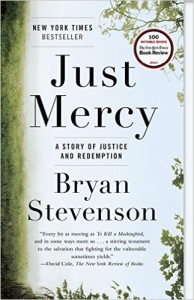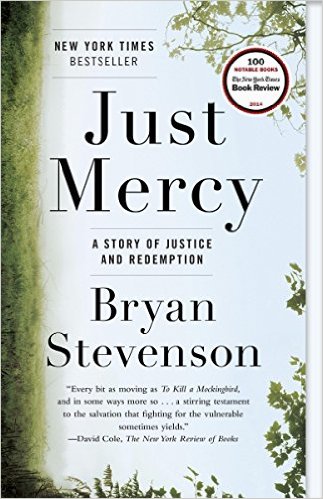
No one who is even marginally aware of the world we live in could possibly fail to understand that America’s criminal justice system is broken. Just how badly broken it is comes into sharp focus in a remarkable new book by Bryan Stevenson, who was awarded a MacArthur Fellowship (“genius grant”) at an early age for his work defending prisoners victimized by the system — work he has continued for two decades since then.
Estimated reading time: 3 minutes
Stevenson’s perspective on the issue is clear: “we have to reform a system of criminal justice that continues to treat people better if they are rich and guilty than if they are poor and innocent.” Amen to that! And if you don’t agree with that statement, you’ll be sure to reach the same conclusion if you read Just Mercy with an open mind.
Just Mercy revolves around the relationship between the author and Walter McMillian, an African-American businessman in Alabama who was wrongly imprisoned on death row for six years. McMillian had been convicted on the strength of absurdly contrived evidence in a criminal justice system that could most charitably be called unmerciful. Interspersed among the chapters detailing Stevenson’s long and arduous campaign that led to McMillian’s release are less detailed stories of dozens of other victims of a system that is based on the premise that “capital punishment means ‘them without the capital get the punishment.'”
Just Mercy: A Story of Justice and Redemption by Bryan Stevenson ★★★★★
Stevenson is a law professor at NYU as well as the director of the Equal Justice Institute, a nonprofit law firm he founded in Montgomery, Alabama, in 1989. Though Just Mercy is built around the tragic story of Walter McMillian, Stevenson weaves into the story an abundance of relevant information about a host of issues related to capital punishment: mass incarceration, racism, overspending on jails and prisons, the rise of private prisons, and the incarceration of the mentally ill (“over fifty percent of prison and jail inmates in the United States have a diagnosed mental illness”). Each of these developments is a factor in the flagrant injustice of the system. In a more general sense, the problem can be seen as the failure of the legal profession to rise to the defense of the people who need their help the most.
As Stevenson concludes, “My work with the poor and the incarcerated has persuaded me that the opposite of poverty is not wealth; the opposite of poverty is justice . . . The true measure of our [national] character is how we treat the poor, the disfavored, the accused, the incarcerated, and the condemned.” By that measure, our character is sorely lacking.
For more great reading
This is one of the many Good books about racism and of 21 excellent memoirs.
This is one of the books included in my post 10 enlightening books about poverty in America and in 6 books that explore our broken criminal justice system.
Like to read books about politics and current affairs? Check out Top 10 nonfiction books about politics.
And you can always find my most popular reviews, and the most recent ones, on the Home Page.



























